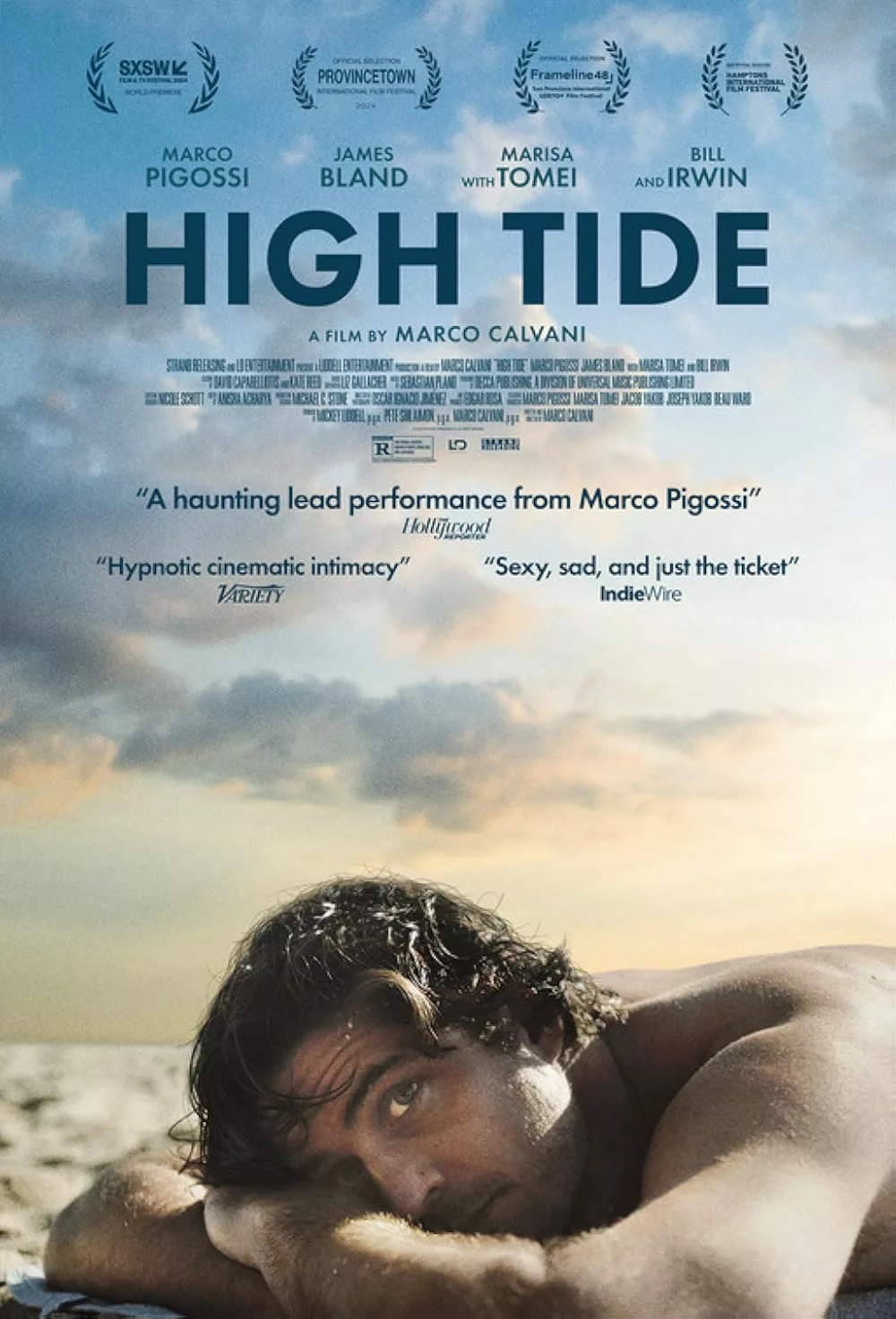Set on the beaches and streets of Provincetown, writer-director Marco Calvani's debut feature "High Tide" is an earnest and tenderhearted story of a young undocumented gay Brazilian named Lourenço (Marco Pigossi) who's counting down his last days in town before having to leave to face an uncertain future. It's steeped in details of a very specific subculture—the moneyed gay or lesbian residents of Provincetown and the young queer visitors who rent their property during summer months—and its sensuously pictorial storytelling ties it to a homoerotic pantheon that also includes Claire Denis' "Beau Travail" and Barry Jenkins' "Moonlight." But the movie also captures a more general feeling of melancholy that settles in when you've had a transformative experience somewhere you'd never been, then look at the calendar and realize it's about to be over. You feel that free-floating anxiety of knowing that something important happened to you. But you aren't sure what it was or what you'll do with the knowledge.
The movie begins with a portent-charged scene that turns out to be a flash-forward: Lourenço goes to the beach, strips off all his clothes, swims out into the ocean, and floats in the water. It's a perfect example of a symbolic image that sums up the whole movie without explaining itself: this is a man whose life and possibilities are suspended, floating, unmoored. The young people who visit Provincetown and interact with Lourenço are similarly unmoored, at least temporarily, from their regular lives. The group includes Mya Taylor (of Sean Baker's film "Tangerine") as Crystal, sort of the druggy den mother of the group, and Maurice (James Bland), a tall, broad-shouldered dreamboat whose fish-out-of-water experience as a gay Black man in a mostly white enclave glancingly mirror's Lourenço's feelings of aloneness. They're drawn together and become briefly entangled; it's a powerful physical attraction that might turn into something more were it not for both men's anxieties. Their sex is steamy and elegantly photographed but also brief and somewhat elliptical, striving for the poetic and nearly succeeding, with many closeups of strong hands touching bare skin.
Shot by Oscar Ignacio Jiménez, who makes the most of the gorgeous seaside settings without leaning on them too hard, "High Tide" plugs into a beautiful, hushed vibe, especially when it's concentrating on Maurice and Lourenço. Their relationship is convincing and moving even though the mandatory third-act breakup feels a bit forced (though Bland powerfully plays it; you can feel Maurice absorbing the hurt, magnifying it, receding into himself), and a lot of Maurice's dialog feels culturally nonspecific and can be awkwardly phrased (though his lovely "Of course when you're about to leave, you finally find a reason to stay" is a poster tagline waiting to happen).
There are multiple knockout supporting performances, and the film has a gift for giving you just enough of the supporting characters to fill them out in your imagination whenever Lourenço leaves their presence. Bill Irwin is touching as the hero's landlord, Steve, an older man who moved to Provincetown during the height of the AIDS crisis to "heal or die" and lost his partner and now rents out his guest house to visitors who work odd jobs to get by during the summer (like Lourenço, who cleans vacation rentals and does miscellaneous handyman work). Seán Mahon is suitably abrasive and unsettling as Bob, a hot-tempered boss of Lourenço's. Bob is irritable partly because his former wife, Miriam (Marisa Tomei), a local painter, left him after falling in love with a woman. Miriam instinctively gets Lourenço, partly because she was willing to turn her own life upside down on a feeling and Lourenço's not there yet. "It's inevitable you might break someone's heart on the way to opening your own," she tells him, then adds, "It's always worth it." (Tomei has been brilliant in two releases this week; the other is "Brothers," a cartoonish slapstick comedy where she plays a woman who develops a long-distance crush on an incarcerated robber. She's equally convincing in both parts. Somebody needs to write her another lead.)
Pigossi is a movie-star presence who truly understands acting for the camera—i.e., letting us feel whatever the character is feeling, confident that the information will be transmitted if he inhabits his character fully, and not feeling that he has to "help" the scene by doing a lot more. There are times when he wisely lets himself be overwhelmed and enfolded by other, more overtly colorful personalities in a scene (many of whom, believably, are not anywhere near as puckishly delightful as they seem to think they are, and are in fact trying way too hard to come across as "characters"; this is not a knock on the actors, who are excellent, but a compliment to the writing). In such scenes, the eye is always drawn back to Lourenço and his beautiful yet haunted face as he tries to sort through conflicted, often unsettled feelings while failing to hide the struggle from onlookers.
One of the most memorable shots in the film is a slow zoom towards a silent Lourenço as he sits center-frame at a dinner table with Steve and his guest Todd (Bryan Batt of "Mad Men"), a too-solicitous lawyer who was invited over in hopes that he could fix the hero's immigration issues and help him stay in the States. There's a lot going on in here at the level of plot and scene-setting/background (and some gentle satire as well, with the older men discussing what all the letters mean in Provincetown's work-in-progress "LGBTQIAP+ Museum"; Todd particularly dislikes the "Q"). But there's also a subtle lament that such a person might decide Lourenço's fate, and astute analysis of anthropologically exact types of people who would never think of themselves as types. Pigossi's face draws everything together, lending weary realism to the scene's journalistic tendencies.
"High Tide" might be too unfocused for its own good, and there are times when it feels more like a series of anecdotes than a fully satisfying narrative: a picaresque tale that stays in one place instead of traveling. But this slight feeling of incompleteness is common to first features, which are mainly a presentation of a filmmaker's style and themes. They succeed on an implicit, bold promise that the voice is rich enough to sustain through more films. That's definitely the case here.




















